How to boost your productivity by changing ”hard work” to “fun work”
Do you find yourself procrastinating especially when you know you have so much work to do? Do you feel like it’s “hard work”? Is the first expression you say “Ugghh, I have so much work to do?” If you do this too, you’re not alone.
I’ve felt this way about work too. Often when we say these things, we make the task we’re doing a mountain that we need to climb, making the task seem very difficult. Thus, to conserve energy, our brain convinces us that it’s better to procrastinate. Then it makes excuses for why we couldn’t do what we said.
It seems counterintuitive that we’d procrastinate on such important work even if we love the work. For example, I’m a blogger and I love to write blog posts for you. But, I’ve found myself procrastinating to write posts at times because I feel like it takes a lot of time and effort.
Are you like me too? If so, keep reading the blog to find out why we actually struggle to work hard, why you don’t need to actually “work hard”, and how to change the words “hard work” to boost your productivity.
Why do we want to work hard?
In our society, we’ve been conditioned to believe that hard work equals success. Hard work is acknowledged, praised, and encouraged. Societal conditioning has taught us that those who work hard earn the most money and are the most successful in life.
In school, we’re taught to work hard. At work, the harder we work, the more likely we are to get more pay or a promotion. Thus, we are motivated to work hard. We want to work hard. Everyone encourages us to work hard.
So naturally, we want to be productive and efficient. Productivity is a huge niche in the personal development industry. Students, employees, and employers all want to learn different ways to be productive.
But we still struggle to work hard even though we know we should. Why?
The problem with working hard
What’s the problem with working hard especially if it’s so praised and rewarded? The problem is that most of us run at the idea of hard work. Our minds do. Unless you’re some extremely disciplined human being, you probably procrastinate or delay tasks that you find “hard work.”
Scientifically speaking, our brains are wired to conserve energy. Our minds want to make tasks as efficient as possible and spend the least amount of energy. This is because evolution has taught us to do so. When we were living in the jungles and in tribes, saving energy was important for survival in case you didn’t have anything to eat later or you had to run from a tiger.
When you repeatedly say, “I have so much work to do” or “Uggghh, I have to work so hard to make money”, your mind thinks this is going to take a lot of energy. Then it tries to save that energy through procrastinating or by making excuses.
Another issue with thinking your work is hard is that your mind will make it very real. One of the rules of the mind is that the mind must make the words you say, the thoughts you think, and the images you visualize real.

Thus, when you say things like “Ugghh, this is such hard work or I have so much work to do”, your mind will view the work you do unnecessarily as more difficult than it is. As a result, you may procrastinate or not be effective at what you do. This rule of the mind was invented by Marisa Peer, Britain’s top hypnotherapist.
So even though society encourages us to work hard and be productive, we struggle to work hard because of the way our mind interprets the words we use.
The solution to working hard
The problem is not the actual work but our attitude towards it. When we think of something as hard work, we create unnecessary resistance in the mind which prevents us from accomplishing the task.
The solution is simple. Reframe the term or phrase “working hard”, “hard work” or “a lot of work”.
But first, what is hard work?
What is hard work?
Have you ever taken a second to pause and think about what “hard work” means?
Hard work is often thought of as work that takes a lot of effort and/or something that takes a lot of time.
Feel the feeling when you hear the phrase “hard work.” How do you feel? What do you think? For me, hard work contains a lot of dense and heavy emotions. I feel resistance. It feels hard like you’re lifting a 50-pound block of concrete.

But just because something takes some time, is it really hard work? Or, if something takes some mental effort, is it really hard work?
Think about it, you go to the gym and lift weights so effortlessly without thinking it’s hard work.
A baby takes time to be birthed but is it hard work (okay well the delivery part is but besides that)? Actually giving birth is probably one of the hardest things in life but we never say that giving birth is hard work. In fact, most mothers tend to enjoy the pregnancy journey and the road to birthing something beautiful into the world.
So if that isn’t hard then why is doing your job that involves sitting in front of a computer and typing feel hard?
Why does creating a company feel hard? A mother bringing her child into this world doesn’t feel like it’s hard. That doesn’t mean she doesn’t have struggles, pains, or challenges. It just means that she’s willing to bare it because the fruit of these pains is greater than her suffering at the current moment.
How to reframe the phrase hard work
Work doesn’t have to be “hard”. Yes, work can take effort and time to complete but it is all about perspective. For example, two workers building a cathedral can have totally different opinions about their work. One worker may think, “I’m slaving and working so hard to put the bricks and concrete together.” Another one may think “I’m building a beautiful cathedral.”

One worker is going to feel more resistance in their mind doing work while the other will feel effortlessness.
There is this myth about work and effort which is that it is hard. As you just witnessed, it doesn’t have to be hard. It can take time and effort but it doesn’t have to be “hard.”
So what if the joy of building your company or whatever it is that you’re doing is greater than the challenges? What if the work that you’re doing is something you’re passionate about and it gives you joy? Even if you’re not passionate about what you do, what is your why for doing it?
When you do something with purpose and meaning, it doesn’t feel like a chore. On the contrary, you can have fun when doing it. You can find meaning and purpose in anything. It doesn’t need to be your passion.
So that’s tip number 1 for reframing hard work or “I have so much work to do” to finding purpose and meaning in what you do.
Here are some additional tips to turn hard work into fun work!
3 tips to make hard work → fun work
1. Find meaning and purpose in what you do
As I mentioned before, a mother giving birth doesn’t feel like she’s doing hard work during labour even though she’s doing one of the most physically intensive things. This is because she knows that the purpose of her push is to give birth to her baby which is extremely meaningful to her.
Finding meaning or purpose in what you do will also keep you intrinsically motivated to work rather than relying on external motivation. You will want to do the work even if it is challenging because ultimately you find it rewarding. You may even feel the work is fun. You may not find every single task fun but it will contribute to a greater purpose.
2. Reframing and changing the words you use
Remember rule number one of the mind? Your mind will make every word you and every thought you think real. So stop saying “I have a lot of work to do” or “This is so hard.” Instead try saying “I’m doing what I love and I have so much fun doing it”.
“This isn’t hard work, it is fun work”.
“This is effortless and feels good.” “I do things effortlessly”.
Now sometimes it might not be realistic to say that this is effortless because you might feel that way. But you can still say “I love what I do even when it takes some effort.”
“Even though this takes effort, I’m so grateful that I’m learning so many things and expanding my mind.”
“I have fun learning new things even when it takes effort.”
Do you feel the shift? It’s all about the shift in perspective and how you think. Even if you don’t love what you do or find no meaning in it, you can always find a way to reframe the way you think about it so it feels good to you.
The key for this to stick is to repeat it. It’s not enough to change the way you think about it once and move on. Remember, that the concept of “hard work” has been wired into your brain for years. This means it will take some time to rewire your brain.
Rule 2 of the mind (again created by Marisa Peer) is that your mind is hardwired for the familiar and resists anything that is unfamiliar. However, rule 3 is that we can make anything we like familiar. So, “hard work” is familiar which means initially your mind will go back to it repeatedly. However, we can make the new definition of work familiar through repetition.
Rule 4 of the mind is that your mind learns through repetition. So every time you feel like you’re doing hard work, change the words you use or think about it differently. Once you do this several times, your brain will make it the new familiar.

3. Make things fun!
Another way to change the concept of hard work is to have fun while you’re doing it because if you’re having fun doing something, it can’t be hard right? Find practical ways to make the things you do fun.
If you’re building a blog and doing technical stuff that isn’t fun, put music on while you do it. If you’re studying and you’re grinding through, create a story from the concepts you’re learning. Use fun stationery to make notes like colourful pens or fancy paper and notebooks. It’ll definitely motivate you!
If you’re at work, maybe you can collaborate with your favourite colleague. Maybe you can create a product or service idea for your company and pitch it to them! If you’re doing something tedious, find a way to increase the challenge or change it up so it feels fun. The possibilities are truly endless. Get creative and brainstorm on how you can make things fun for you.
Bottom line: When you enjoy something and find joy in it, it doesn’t feel hard. It is fun!
How are you going to make the work you do fun for you? Which of these techniques are you going to use? Have you thought of anything else that can make work fun for you? Comment below!



One Comment
Lorretta
I just found your blog and I’m immediately interested! Your content is amazing.